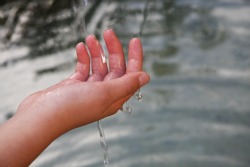"Years gone by about sixty, we were burned in the oven in this century; the gas tried to choke, but it couldn’t choke me… come overseas trying to be free…erase the demons out of our memory. Changed your name and your identity … cut off the roots to your family tree… don’t see that’s not the way to be."
I'm What!
It wasn’t until after the birth of our first child, when I visited my grandmother for the first time since I was a child, that I found out the truth about our family. Sitting there on Savtah’s living room couch, my grandmother dropped a bomb shell on me; I’m Jewish. Listening to her explain the years of secrecy, my head was swimming. I knew my family was newer immigrants to America and that Savtah had strange traditions from the ‘Old Country’, but I never put two and two together. Now it was all beginning to make sense. The strange names we used for grandmother and grandfather, the nice Friday night meals with candles and flowers; why hadn’t I figured it out before? In shock I sat and listened to my aging Savtah explain it all.
As Savtah spoke, I could hear the desperation in her voice. Desiring for me to continue the heritage that my mother had forsaken, she took advantage of our time together to teach me. I was now in Savtah’s crash course of everything Jewish. What started out as an afternoon visit, turned into two days of lessons and stories. Some of the stories have been lost as a distant memory, while others remain a treasured memory.
In the wealth of information that Savtah shared, she told me the story of her first trip to the mikvah the night before her wedding. Her eyes filled with tears as she spoke her trip by horse and buggy under the cover of darkness. Accompanied by several women in the community, when they arrived they had to break the ice along the river’s shore. Although the water was cold, she explained how this was a special moment in her life and that the women who accompanied her did everything they could to make her feel special. After her dip, she stepped onto the river’s bank where her mother was waiting with a lit candle and flowers. Savtah smiled big as she told me how the long ride there seemed shorter going home as they sang songs and rejoiced. At the time, I had no idea that a mikvah was required to be an offical community and I never asked why they went to the river. I just listened in awe of everything she was telling me. Latter she talked about coming to America and about the mikvah in New York. Without the modern connivances for collecting rain water and storage, the men of the congregation brought barrels of water or ice from the river to be used in the mikvah. I could hardly imagine the chore this must have been.
Savtah explained how the tradition of women using a mikvah had been passed down from our matriarch Sarah and how Miriam’s well was a mikvah. She talked about the hardships my ancestors had endured to ensure that this tradition continued. With tears running down her cheeks, Savtah told me about the hardships endured by so many women during Hitler’s reign of terror. Before I left, she made me promise many things, one of which was that I would pass this tradition on my daughter.
As Savtah spoke, I could hear the desperation in her voice. Desiring for me to continue the heritage that my mother had forsaken, she took advantage of our time together to teach me. I was now in Savtah’s crash course of everything Jewish. What started out as an afternoon visit, turned into two days of lessons and stories. Some of the stories have been lost as a distant memory, while others remain a treasured memory.
In the wealth of information that Savtah shared, she told me the story of her first trip to the mikvah the night before her wedding. Her eyes filled with tears as she spoke her trip by horse and buggy under the cover of darkness. Accompanied by several women in the community, when they arrived they had to break the ice along the river’s shore. Although the water was cold, she explained how this was a special moment in her life and that the women who accompanied her did everything they could to make her feel special. After her dip, she stepped onto the river’s bank where her mother was waiting with a lit candle and flowers. Savtah smiled big as she told me how the long ride there seemed shorter going home as they sang songs and rejoiced. At the time, I had no idea that a mikvah was required to be an offical community and I never asked why they went to the river. I just listened in awe of everything she was telling me. Latter she talked about coming to America and about the mikvah in New York. Without the modern connivances for collecting rain water and storage, the men of the congregation brought barrels of water or ice from the river to be used in the mikvah. I could hardly imagine the chore this must have been.
Savtah explained how the tradition of women using a mikvah had been passed down from our matriarch Sarah and how Miriam’s well was a mikvah. She talked about the hardships my ancestors had endured to ensure that this tradition continued. With tears running down her cheeks, Savtah told me about the hardships endured by so many women during Hitler’s reign of terror. Before I left, she made me promise many things, one of which was that I would pass this tradition on my daughter.




Thanks for a very powerful article!